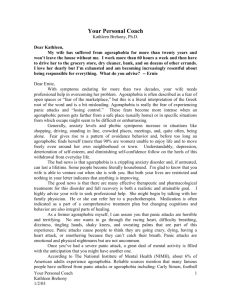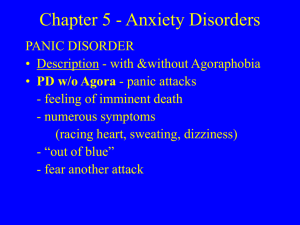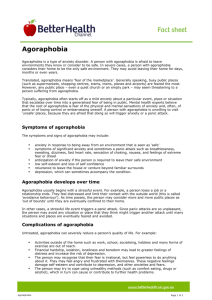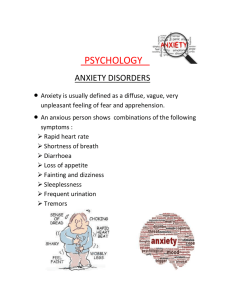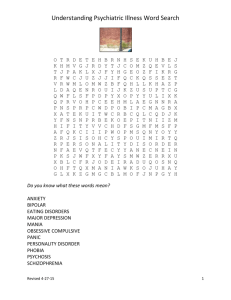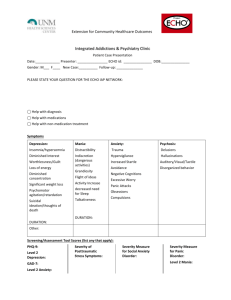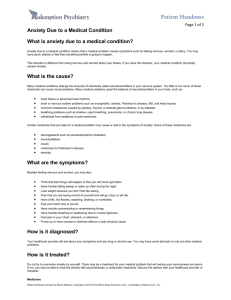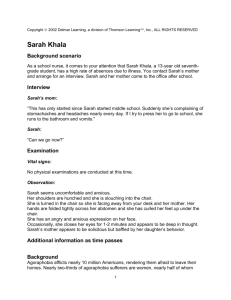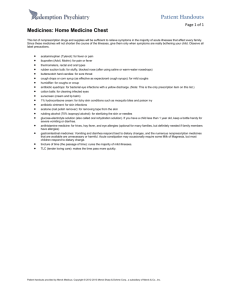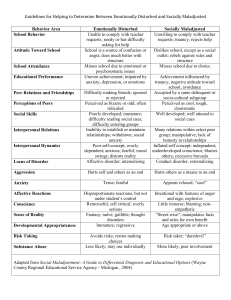Agoraphobia - Redemption Psychiatry
advertisement
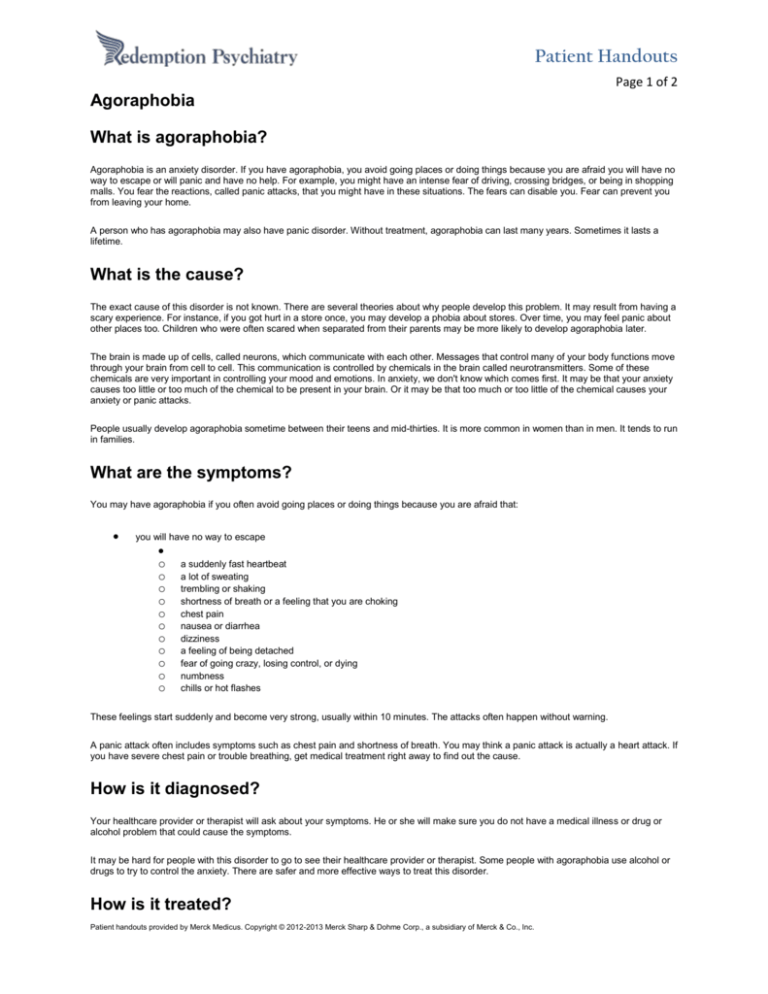
Patient Handouts Page 1 of 2 Agoraphobia What is agoraphobia? Agoraphobia is an anxiety disorder. If you have agoraphobia, you avoid going places or doing things because you are afraid you will have no way to escape or will panic and have no help. For example, you might have an intense fear of driving, crossing bridges, or being in shopping malls. You fear the reactions, called panic attacks, that you might have in these situations. The fears can disable you. Fear can prevent you from leaving your home. A person who has agoraphobia may also have panic disorder. Without treatment, agoraphobia can last many years. Sometimes it lasts a lifetime. What is the cause? The exact cause of this disorder is not known. There are several theories about why people develop this problem. It may result from having a scary experience. For instance, if you got hurt in a store once, you may develop a phobia about stores. Over time, you may feel panic about other places too. Children who were often scared when separated from their parents may be more likely to develop agoraphobia later. The brain is made up of cells, called neurons, which communicate with each other. Messages that control many of your body functions move through your brain from cell to cell. This communication is controlled by chemicals in the brain called neurotransmitters. Some of these chemicals are very important in controlling your mood and emotions. In anxiety, we don't know which comes first. It may be that your anxiety causes too little or too much of the chemical to be present in your brain. Or it may be that too much or too little of the chemical causes your anxiety or panic attacks. People usually develop agoraphobia sometime between their teens and mid-thirties. It is more common in women than in men. It tends to run in families. What are the symptoms? You may have agoraphobia if you often avoid going places or doing things because you are afraid that: you will have no way to escape o o o o o o o o o o o a suddenly fast heartbeat a lot of sweating trembling or shaking shortness of breath or a feeling that you are choking chest pain nausea or diarrhea dizziness a feeling of being detached fear of going crazy, losing control, or dying numbness chills or hot flashes These feelings start suddenly and become very strong, usually within 10 minutes. The attacks often happen without warning. A panic attack often includes symptoms such as chest pain and shortness of breath. You may think a panic attack is actually a heart attack. If you have severe chest pain or trouble breathing, get medical treatment right away to find out the cause. How is it diagnosed? Your healthcare provider or therapist will ask about your symptoms. He or she will make sure you do not have a medical illness or drug or alcohol problem that could cause the symptoms. It may be hard for people with this disorder to go to see their healthcare provider or therapist. Some people with agoraphobia use alcohol or drugs to try to control the anxiety. There are safer and more effective ways to treat this disorder. How is it treated? Patient handouts provided by Merck Medicus. Copyright © 2012-2013 Merck Sharp & Dohme Corp., a subsidiary of Merck & Co., Inc. Patient Handouts Page 2 of 2 Psychotherapy Seeing a therapist is helpful. Several types of therapy can help treat agoraphobia: cognitive-behavioral therapy (learning to change your response to situations that cause anxiety) relaxation therapy desensitization (practicing how to deal with increasingly scary situations) visual imagery (practicing how to deal with a situation that causes anxiety by picturing it in your mind) support groups The treatment your provider or therapist uses may depend on how much the disorder interferes with your day-to-day life. Medicine Several medicines can help. Your provider will work with you to carefully select the best one for you. Claims have been made that certain herbal and dietary products help control agoraphobia symptoms. No herb or dietary supplement has been proven to consistently or completely relieve agoraphobia. Supplements are not tested or standardized and may vary in strength and effects. They may have side effects and are not always safe. Yoga and meditation may also be helpful. You may want to talk with your healthcare provider about using these methods along with medicines and psychotherapy. How can I take care of myself? Get support. Talk with family and friends. Consider joining a support group in your area. Realize you are not alone and that your anxiety can be overcome. You may be able to face situations that make you anxious if someone you trust is with you. Learn to manage stress. Ask for help at home and work when the load is too great to handle. Find ways to relax, for example take up a hobby, listen to music, watch movies, and take walks. Try deep breathing exercises when you feel stressed. Take care of your physical health. Try to get at least 7 to 9 hours of sleep each night. Eat a healthy diet. Limit caffeine. If you smoke, quit. Avoid alcohol and drugs. Exercise according to your healthcare provider's instructions. Check your medicines. To help prevent problems, tell your healthcare provider and pharmacist about all the medicines, natural remedies, vitamins, and other supplements that you take. Contact your healthcare provider or therapist if you have any questions or your symptoms seem to be getting worse. Patient handouts provided by Merck Medicus. Copyright © 2012-2013 Merck Sharp & Dohme Corp., a subsidiary of Merck & Co., Inc.

